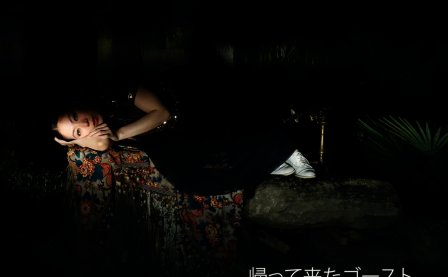Be they idealized selves, unrealized hopes, inescapable reputations, repressed memories, guarded secrets, shadowy others, niggling self-doubts, or recurring fears, we all suffer from ghosts of one kind or another. But it’s possible that those musicians in the public gaze are haunted by the most inescapable and virulent specters of all. Having their identities and personas scrutinized, distorted, and embellished to the point where the resulting profiles are less a faithful description of who they and more a faithless proscription of who they should be, they often find themselves stalked and harassed by a second self they can’t escape, that they have little choice but to embrace, no matter how much they strive to turn over a new leaf and falsify it.
Maybe this is what Tujiko Noriko is referring to with the title of her latest, My Ghost Comes Back, because after a lapse of four years spent collaborating with the likes of Nobukazu Takemura and John Chantler, as well as traveling from one corner of the globe to another, she’s reuniting with her own mythologized and semi-fictive other half for the first time since the solo effort that was 2008’s Trust. But even if the scattered and sprawling delicacy of her newest could in theory be read as a comment on the discomfort and malaise surrounding every half-truth that’s been imposed on her, such as the all-too easy comparisons to Björk (not entirely unfair) and Kate Bush (not entirely fair), it’s much more rewarding to situate the album on a more private and personal level, and realize that its wayward pop experimentalism charts the process of self (re)discovery that can save us from living an other-inflicted lie.
This realization is helped by the arc My Ghost Comes Back seems to trace. Beginning with the halting and hesitant “My Heart Isn’t Only Mine,” where sleepy organs, creaking violas, and awakening vibraphones emphasize the doubt and pathos in Noriko’s otherwise comfortably subdued delivery or, more specifically, the wounded presentiment that her identity is a mere implant, a form of remote control. However, from this melancholic tableau, the album slowly but surely assumes emotional focus and determination. “Land Next to Me,” in its pattering drum-machined beat and watery guitar strokes, sees Noriko lucidly facing up to what she and guest vocalist Maxwell August Croy must do in order to regain access to their better, “truer” selves (“Open your palms/ Open your heart/ Open this gate”). Similarly, the lamenting synthesizers of “Give Me Your Hands” journeys toward a discreetly epiphanic climax, with its rallying drums and ascending vocal melody suggesting that Noriko, before our very ears, is remembering who she is and regaining the long-lost confidence to re-actualize such a memory.
And in contrast to the disordered and often alienated glitching of earlier albums like 2002’s Make Me Hard and 2005’s Blurred In My Mirror, which if anything expressed the issues and misgivings Noriko had with accepting an identity that was probably little more than a Trojan horse for someone else’s worldview and ideology, My Ghost Comes Back witnesses a gradual crystallization away from off-beat percussion, scatty electronics, and twitching melodics toward a more cohesive and concerted aesthetic, thereby reinforcing her newfound reconciliation with who she is and her role(s) in life. “Through the Rain” features an upbeat and insistent organ progression that carries Noriko through the lingering uncertainty remaining in her breathy singing, commingling with frisky synths and shimmered mandolin to evoke an unexpectedly aquatic or nautical resonance. Here, it’s as if Noriko is voyaging or emerging through once troubled waters, and this sense of emergence is galvanized by the solemn confidentiality of “Under the White Sheets,” which from a reserved, creeping entrance of fractured koto and spectral noise hardens into a determined march through heavy beats and unrelenting drones.
That’s not to say there aren’t reservations and waverings to be found along the path that My Ghost Comes Back maps. Like all odysseys, the album has its oscillations between purposive conviction and pensive anxiety, with its atmosphere of dignified boldness occasionally lapsing into the maudlin remembrances of a “Minty You” or “12 Moons.” In the latter, staccato pinpricks of electric guitar dot and dash over echoed splotches of piano, coloring Noriko’s wistful recollections of her past lives and failures (“Forget that you tried/ You’ve laid here before/ You’ve slept on that floor”). But even with its plangent detour into nostalgia and former sorrows, Noriko is now strong enough to end it on a quietly tenacious note, telling herself “I’m leaving here soon” as the song needles to its deceptively resolute close.
This caution in self-realization — the apprehension that conspicuousness would self-defeatingly provide the cue for others to nip your emergence in the bud before it ever had the chance to take root — is finally rewarded at the close of My Ghost Comes Back, where from an opening of tentative synth-steps and Noriko’s sober declarations of intent, the title track abruptly blasts into an unstoppable wave of self-affirmation. It’s not as though the song doesn’t furnish warning signs, what with the rippled tension of its chords and the bass-led descent of its pregnant lull, but when the outburst of unrelenting electro-whiteout arrives at the six-minute mark, it comes as a complete and unsullied triumph, even if such lyrics as “My satellite” and “You are mine” would imply that Noriko has simply made peace with the external sources of her identity and hasn’t rediscovered those residing within. But regardless of whether this fountainhead is sited outside or inside her physical borders, the force of the track’s sustained, monolithic close proves that her recognition of such a source imbues her with a renewed power over it and therefore over her own life, because as the exhilarating mantle of synthesizer razes the album to the ground after an hour of poignancy and poise, she sounds nothing short of invincible.
More about: Tujiko Noriko




